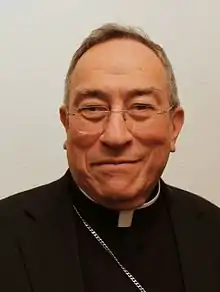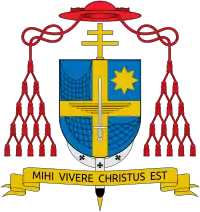Óscar Rodríguez Maradiaga
Óscar Andrés Rodríguez Maradiaga, S.D.B. (born December 29, 1942) is a Salesian and Cardinal of the Catholic Church from Honduras. He is the current Archbishop of Tegucigalpa, is the former President of Caritas Internationalis and served as President of the Latin American Episcopal Conference (CELAM) from 1995 to 1999. Rodríguez was elevated to the cardinalate in 2001. He has been the Vatican's spokesman with the International Monetary Fund and the World Bank, on the issue of Third World debt.[1]
His Eminence Óscar Andrés Rodríguez Maradiaga | |
|---|---|
| Cardinal, Archbishop of Tegucigalpa | |
 | |
| Archdiocese | Tegucigalpa |
| See | Tegucigalpa |
| Appointed | 8 January 1993 |
| Predecessor | Héctor Enrique Santos Hernández |
| Other posts | Cardinal-Priest of Santa Maria della Speranza Coordinator of the Council of Cardinals |
| Orders | |
| Ordination | 28 June 1970 by Girolamo Prigione |
| Consecration | 8 December 1978 by Gabriel Montalvo Higuera |
| Created cardinal | 21 February 2001 |
| Rank | Cardinal-Priest |
| Personal details | |
| Birth name | Óscar Andrés Rodríguez Maradiaga |
| Born | December 29, 1942 Tegucigalpa, Honduras |
| Denomination | Roman Catholic |
| Previous post |
|
| Motto | Mihi Vivere Christus Est (For to Me to Live is Christ) |
| Coat of arms |  |
| Styles of Óscar Andrés Rodríguez Maradiaga | |
|---|---|
 | |
| Reference style | His Eminence |
| Spoken style | Your Eminence |
| Informal style | Cardinal |
| See | Tegucigalpa |
Early life
He was born in Tegucigalpa in Honduras, the third of the four children of Andrés Rodríguez Palacios and Raquel Maradiaga. As a boy, he dreamed of playing the saxophone in a dance band or becoming a pilot. Instead, he received an internal call for the religious life and joined the Salesians on May 3, 1961.
He earned doctorates in philosophy from the Institute "Don Rua" in El Salvador, in theology from the Salesian Pontifical University in Rome and moral theology from the Pontifical Lateran University. From the Austrian University of Innsbruck Rodríguez received a diploma in clinical psychology and psychotherapy.
Ordination
He was ordained a priest on July 28, 1970, by Archbishop Girolamo Prigione in Guatemala City. Father Rodríguez was named the bishop's assistant in Tegucigalpa in the same year. He was dean of the Theology Department for three years at Guatemala's Francisco Marroquín University from 1975.
He then taught chemistry, physics, and music at Salesian colleges in El Salvador, Honduras, and Guatemala over the next fifteen years. During this time he also became a professor of moral theology and ecclesiology at the Salesian Theological Institute in Guatemala. He was also trained in classical piano and did studies in music in El Salvador, Guatemala, and the United States.
He speaks English, French, Italian, German, and Portuguese in addition to his native Spanish.
Bishop and cardinal
On October 28, 1978, Rodríguez was named auxiliary bishop of Tegucigalpa and titular bishop of Pudentiana. He received episcopal consecration on the following December 8 from Archbishop Gabriel Montalvo, with Archbishops Héctor Santos Hernández and Miguel Obando y Bravo serving as co-consecrators. Rodríguez was named Archbishop of Tegucigalpa on January 8, 1993.
Archbishop Rodríguez was created Cardinal-Priest of Santa Maria della Speranza by Pope John Paul II in the consistory of 21 February 2001. He is the first cardinal from Honduras.
In addition to his episcopal responsibilities, he is currently the President of the Episcopal Conference of Honduras. Rodríguez was one of the cardinal electors who participated in the 2005 papal conclave that selected Pope Benedict XVI.
Cardinal Rodríguez was elected on 5 June 2007, as the new Caritas Internationalis President by the Caritas Confederation members at their 18th General Assembly in Vatican City. He was reelected 24 May 2011.[2] He was the global representative for the next four years.
Since December 2001, he has received a pension of 100,000 lempiras a month from the budget of the President of Honduras, published in Acuerdo Ejecutivo 046-2001 published December 7, 2002, in La Gaceta.[3][4]
On 12 June 2012, Cardinal Rodriguez Maradiaga was appointed a member of the Congregation for Catholic Education for a five-year renewable term.[5]
He was one of the cardinal electors who participated in the 2013 papal conclave that selected Pope Francis.
On 13 April 2013, he was appointed to the Council of Cardinal Advisers, a group of cardinals established by Pope Francis to advise him and to study a plan for revising Pastor Bonus, the Apostolic Constitution on the Roman Curia.[6]
In 2013 an interview with Salt and Light, he said, "It is not just taking the constitution Pastor Bonus and trying to change this and that," referring to the 1988 papal constitution governing the organization of the Roman Curia. "No, that constitution is over," he said. "Now it is something different. We need to write something different."[7]
Reflecting on the reorganisation of the Roman Curia, his advisory role to the pope and Catholic response to climate change. The cardinal made the comment in a September 23 interview with Catholic News Service in New York, where he was participating in interreligious meetings in his capacity as president of Caritas Internationalis. Reformation of the Roman Curia, the church’s central administrative offices, is a normal response to changing times, has a significant 20th-century precedent, and was a focus of the pre-conclave meetings before Pope Francis was elected, Cardinal Rodriguez said. “Many people do not look back at history and they think now it’s a revolution. No! This is a normal process… that takes place in order to answer to the new signs of the times,” he said.[8]
On 10 March 2015, according to an online news brief by Catholic News Service (CNS), Cardinal Rodriguez, who is the President of Caritas Internationalis, received the University of Dayton's Archbishop Oscar Romero Human Rights Award for his humanitarian work. Archbishop Romero, who was beatified as a martyr on 23 May 2015 and is honored in a few other Christian denominations, was Archbishop of the Roman Catholic Archdiocese of San Salvador in San Salvador, El Salvador, when he was assassinated on March 24, 1980, in a hospital chapel while saying Mass, by a death squad assassin.[9]
On 15 October 2020, Pope Francis renewed Rodríguez' appointment as Coordinator of the Council of Cardinal Advisers.[10]
Views
Rodríguez was the Holy See's spokesman with the International Monetary Fund and the World Bank on the issue of Third World debt, and he has encouraged countries to give development aid.[1]
In 2009, Cardinal Rodríguez agreed with the Pope that condoms cannot be of any real benefit in the fight against AIDS.[11]
Cardinal Rodríguez Maradiaga, in a May 2002 interview with the Italian Catholic publication 30 Giorni, claimed that to divert attention from the Israeli-Palestinian crisis, Jews influenced the media to exploit the current controversy regarding sexual abuse by Catholic priests. That provoked outrage from the Anti-Defamation League.[12]
Rodríguez Maradiaga believes the Church must be "open" and in "constant dialogue", following the Second Vatican Council's example in rejecting attitudes of "arrogance and superiority".[13]
Accusations
Political interference
In 2007, Cardinal Rodríguez was appointed to head the new "Commission of Notables" on the study of the energy crisis as it impacted Honduras. When challenged in an international interview about being unqualified for such a task, he responded quietly that he was educated in chemical engineering in Texas and knew a thing or two about petroleum. His choice as leader, however, was not his technical knowledge but the national respect for his integrity and his neutrality towards political groups in the country.
In 2008, Cardinal Rodríguez criticized President Manuel Zelaya for using public money to promote his plans instead of spending it on the poor. He stated: "We were good friends. But he changed drastically... It was Chávez."[14]
The Church, according to a spokesman, did not favor either the deposed Zelaya's alleged re-election plans or the coup a against him. In a televised speech, Rodríguez warned that the return of Zelaya could lead to a bloodbath. He also called on the new government to promote national reconciliation and let aside revenge, pursuit, violence, and corruption. He further urged the Organization of American States to investigate all illegal deeds that happened during the rule of Zelaya.[15][16]
Rodríguez was later accused by Zelaya of conspiring and collaborating with the coup leaders.[17]
Financial mismanaging
The Italian journal L'espresso reported that Argentine bishop Jorge Pedro Casaretto – sent by Pope Francis as an apostolic envoy to Honduras – returned with a report in 2017, suggesting that Maradiaga may have been involved in mismanaging Church funds, and may also have accepted hundreds of thousands of dollars from the Catholic University of Tegucigalpa.
Maradiaga is accused of investing more than $1.2 million in some London financial companies, including Leman Wealth Management. Some of that money has now vanished, it said. Casaretto's report was based on accounts from more than 50 witnesses, including diocesan staff members and priests, L'espresso said.[18] Pope Francis ordered an investigation to be done into the finances of the Cardinal in December 2017.[19]
Pineda coverup
Martha Alegría Reichmann, the widow of former Vatican ambassador Alejandro Valladares Lanza, accused Cardinal Óscar Rodríguez Maradiaga of maintaining an abusive and mafia-like regime in Honduras for decades, promoting false investment schemes, diverting money from the local university and from the government to shadowy and immoral purposes in a 2018 book entitled Traiciones sagradas ("Sacred Treasons"). She also accuses him of ruthlessly protecting his corrupt auxiliary bishop Juan José Pineda Fasquelle, who was forced to resign in 2018 following accusations of sexual abuse of seminarians.[20]
References
- Caritas Internationalis President
- The Cardinals of the Holy Roman Church - Additions 2011
- "La Gaceta". 2009-07-08. Retrieved 2009-07-12.
- Cien mil lempiras mensuales para el Cardenal Rodríguez
- "Archived copy". Archived from the original on 2012-12-05. Retrieved 2012-06-12.CS1 maint: archived copy as title (link)
- "Archived copy". Archived from the original on 2013-04-28. Retrieved 2013-04-13.CS1 maint: archived copy as title (link)
- http://www.catholicnews.com/data/briefs/cns/20150312.htm#head16
- "Resignations and Appointments, 15.10.2020" (Press release). Holy See Press Office. 15 October 2020. Retrieved 15 October 2020.
- Golias article
- ADL Outraged by Honduran Cardinal's Jewish Conspiracy Theory Archived 2009-05-11 at the Wayback Machine
- "Crisis in Honduras What was really behind the removal of President Manuel Zelaya, and is he likely to be reinstated?". Poder. October 2009. Archived from the original on 2011-07-25.
- Catholic Church did not favor Honduras Coup d'État
- Honduras Cardinal asks ousted president not to come back Archived 2009-07-09 at the Wayback Machine
- Ousted Honduran President Manuel Zelaya Speaks from Nicaraguan Border
- "Volunteering and Dating: More Similar Than You May Think". The Volunteer Management Report. 22 (2): 4. 2017-01-16. doi:10.1002/vmr.30577. ISSN 1091-3777.
- Winfield, Nicole (2018-07-20). "Pope removes Honduran bishop accused of sexual misdeeds". AP NEWS. Retrieved 2019-05-19.
External links
- "Rodríguez Maradiaga Card. Óscar Andrés, S.D.B." Holy See Press Office. Archived from the original on 4 September 2017. Retrieved 24 November 2017.
| Catholic Church titles | ||
|---|---|---|
| Preceded by Héctor Enrique Santos Hernández |
Archbishop of Tegucigalpa 8 January 1993–present |
Incumbent |
